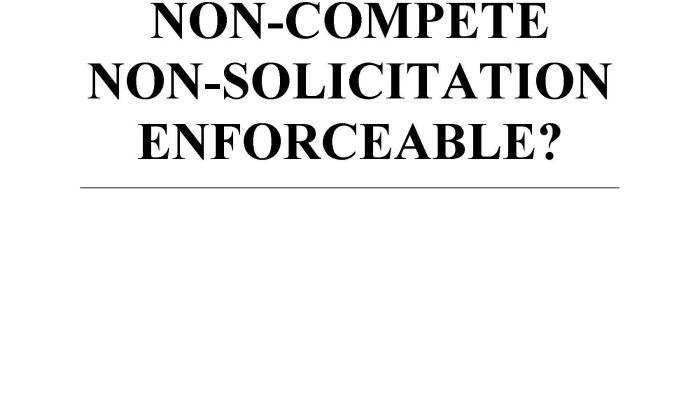Non-Competition Covenants in Share Purchase Agreements Attract Renewed Judicial Attention

A covenant that restricts a person from operating in an area or industry is commonly known as a non-competition clause. These clauses can be built into agreements with the intention that the seller of a business, or a new business partner, will not take the expertise and reputation gained from the role and use it to compete with the business.
Courts have typically approached non-competition clauses in two ways, drawing from the most recent Supreme Court of Canada case considering the same, Payette v Guay, [2013] 3 SCR 95. In Payette, the Supreme Court of Canada essentially outlined the two analyses to be used: in situations where an employee is being asked to sign a non-competition clause, the Court will assume that there is a power imbalance between the employer and the employee, which necessitates more rigor and intensity in analyzing whether the non-competition clause is reasonable and necessary; in situations where the non-competition clause is the result of a seller-purchaser relationship, the Court does not presume a power imbalance to be present and applies a less rigorous analysis, since it does not need to protect one party in a situation where the two parties are presumed equals.
In a recent decision from the Alberta Court of the Queen’s Bench, 961945 Alberta Ltd. (Servicemaster of Edmonton Disaster Restoration) v Meyer, 2018 ABQB 564, the Court grapples with a situation where the roles of “purchaser” and “employee” overlap. In Servicemaster, Meyer was an employee who signed an employment agreement with ServiceMaster of Edmonton Disaster Restoration (“ServiceMaster”) that did not contain a non-competition clause. Meyer proved himself to be a very valuable employee and was invited to purchase shares of ServiceMaster’s holding company, KJM Investments Inc. (“KJM”), along with several other employees. Meyer and some of the others chose to purchase the shares and he received 16.7% of KJM pursuant to what was termed an Employee Share Purchase Agreement (the “ESPA”). The ESPA contained non-competition provisions. In this decision, the Court held that Meyer should be afforded the more rigorous approach to non-competition clauses, outlining that though “[t]he evidence does not strongly support an imbalance of bargaining power between Meyer and ServiceMaster…this, in my view, does not mean that the rules applicable to employment contracts do not apply” (para. 19). Meyer claimed that the decision to enter into the ESPA was affected by a concern for his employment, which the Court found persuasive, but additionally, the Court considered the underlying reason for the non-competition covenant. Specifically, the Court stated that the “principal reason for the non-competition covenant is Meyer’s employment by ServiceMaster…” (para. 20). Under the ESPA, Meyer was only entitled to receive value for his shares if he continued his employment – if his employment was terminated in less than 1 year, he would receive $10 (the same as the purchase price of the shares), however for each additional year of employment, he would be entitled to an additional 20% of the assessed value of the shares. The Court considered the shares therefore to be an inventive to retain an employee, and so considered the appropriate framework for analysis for the non-competition clause to be one with an eye to protecting an employee after termination of employment.
While this decision is heavily based on the particular facts of this case, it does indicate that there are circumstances where Courts may treat shareholder-employees in a different manner from non-employed shareholders. Restrictive covenants in share purchase agreements should be carefully considered to ensure that they are reasonable and drafted in an enforceable manner, and with an eye to the context of the covenant.
————————————–
DISCLAIMER: The articles and information provided by JarvisLegal are general legal guidance or information only and not legal advice of any nature and should not be relied upon in any manner. By reading or sharing the information, there is no lawyer-client or other relationship created. If you wish to receive legal advice or assistance from JarvisLegal, please contact us today to find out how we can assist you, your business, or your organization.
